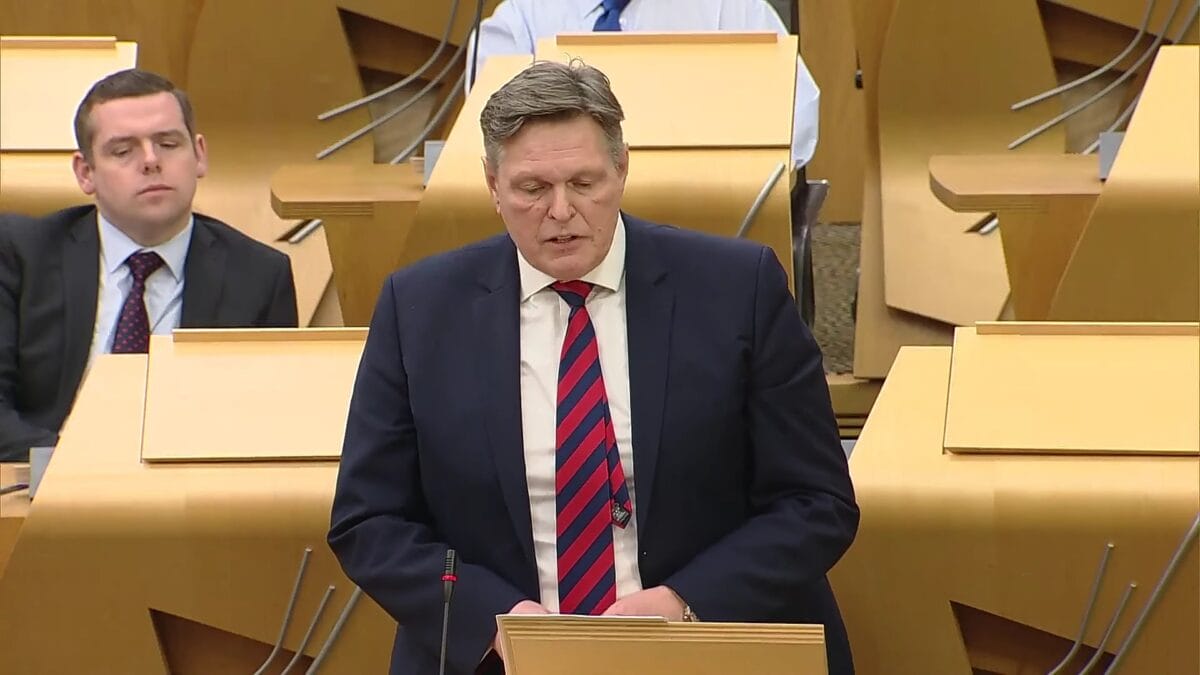Scottish campaigners have accused powerful US law firms of planning to exploit whistleblowing procedures in Britain by “bounty hunting” for easy cases that allow them to cash in on compensation schemes.
The Ferret found that top American legal firms – which have netted multi-million dollar compensation awards – are cited as supporters of Whistleblowers UK which manages a cross-party group of MPs currently examining the issue.
Activists such as Jules Rose – who fought to expose the actions of rogue surgeon Professor Sam Eljamel, suspended from NHS Tayside in 2013 – fear a looming US-style corporatisation of whistleblowing. Rose and others raised concerns over these firms’ influence over legislation and ability to potentially shape laws in ways that align with their interests and expertise.
She and others fear laws may be designed to benefit legal representatives of whistleblowers leading to more legal action and fees for these firms – putting profits before people.
Mary Robinson, chair of this cross-party group called the Whistleblowing All Party Parliamentary Group (APPG), last year proposed a bill to create a US-style Office of the Whistleblower for the UK.
Some fear the office would report to the government – compromising its independence and discouraging whistleblowers from exposing problems in public services.
In the US, unlike the UK, the federal government has wide ranging powers to fine and sanction organisations with companies who breach the law being fined many millions of dollars. The individual who blows the whistle on possible fraud or other wrongdoing can recover a compensation payout – or bounty – of between 10 per cent and 30 per cent of the total fine.
Jules Rose – who had a tear gland instead of a brain tumour removed by Eljamel at Ninewells – fought for years for justice. She said: “If this bounty hunting system was adopted it would definitely be seen as a money-making exercise. My fear would be that the toxic culture engulfed in our NHS system today would remain.
“Whistleblowers already live in fear of the reverberations from speaking out. Having a US bounty style system in Scotland would muddy the already dirty water, targeting lucrative cases and side-stepping others which still puts patient safety at serious continued risk. This would never get to the root cause which is to encourage and educate those with the powers to change and reduce the toxicity culture within the healthcare system surrounding whistleblowing.”
There is a real danger that cases will be decided on the likely profit to be made for the law firm from the information disclosed by the whistleblower.
Eileen Chubb, Compassion in Care
Critics claim offering cash incentives for whistleblowing may contradict the Nolan principles which emphasise selflessness, neutrality and the importance of public servants avoiding actions driven by personal gain.
This could potentially erode public trust in whistleblowers, they say. NHS staff are also contractually and ethically obliged to report concerns they observe in their workplace.
Offering financial rewards could create a potential conflict of interest as staff would be receiving extra compensation for fulfilling a part of their job description.
Mum of two Jules, from Kinross, added: “This bounty system would instead line the pockets of those not willing to support and implement change for a safer NHS.”
US firms such as Constantine Cannon – which specialises in whistleblowing and anti-monopoly laws and has offices in New York, Washington and San Francisco – is listed as a supporter on the APPG website.
Since 1995, the firm has won more than £354m in whistleblower rewards. In 2017, the firm started a whistle-blower practice in London with the goal of building cases in the United States with the help of whistle-blowers in Britain and Europe.
International employees can make a claim if it is about a publicly listed company or a company with a sufficient link to the US.
Another supporter listed is Washington-based whistleblowing legal specialist Kohn, Kohn & Colapinto which boasts of “winning the largest whistleblower rewards in history”. One recent case handled by the company was that of Howard Wilkinson, who blew the whistle on Russian money laundering, recovering £1.5bn for the victims of the Danske Bank fraud.

A third specialist US law firm DRRT – which has recovered £788,380,000 in landmark cases across the world – is mentioned as another supporter.
Campaigners say support from US law firms for reform of whistleblowing laws in the UK is a conflict of interest as they have a clear vested financial interest in the outcome of these reforms.
The UK Public Interest Disclosure Act 1998 safeguards employees who expose workplace wrongdoing. However, it has faced criticism for not adequately protecting certain whistleblowers, leading to calls for reform.
Last year, two private members’ bills suggested replacing the existing framework with a new ‘Office of the Whistleblower’ that would impose civil and criminal penalties for violations.
The UK Government has recognised the need for reform and initiated a review of the whistleblowing framework in March to explore potential changes.
Minh Alexander, a retired consultant psychiatrist and NHS whistleblower, has written to various government committees outlining her fear there is a “high risk of misuse of public funds if the US bounty hunting model is replicated in the UK”.
She said: “I oppose the bounty hunting model strongly but fear the government will try to introduce it anyway as a money-making scheme for cronies. The Whistleblowing APPG was established with money from US bounty hunting lawyers and it has an external secretariat in the form of a private company WhistleblowersUK.
“WhistleblowersUK has advocated for whistleblower rewards and latterly has euphemistically dressed this up as ‘compensation’ but in contexts which indicate rewards are being posited.
“Members of the APPG have also advocated for whistleblower rewards and ‘incentives’.” Alexander added: “It is not about other forms of whistleblowing in the public interest. It does not care about the welfare of all whistleblowers.
“It wishes only to identify those who will recover the most money for the state, be they genuine whistleblowers or criminals who rat on other criminals.”
Whistleblowers already live in fear of the reverberations from speaking out. Having a US bounty style system in Scotland would muddy the already dirty water.
Jules Rose, activist
Another high-profile health campaigner – Rab Wilson – also fears the move would signal a “creeping corporatisation” of whistleblowing. Former mental health nurse Wilson’s whistleblowing over the NHS Ayrshire baby deaths scandal led to a major shake-up of the system.
A leading voice in campaign group Action for Safe and Accountable People’s NHS ASAP, Wilson told The Ferret: “These firms only go for the low hanging fruit and cases which can make them money.
“It is part of the creeping corporatisation and Americanisation in the UK and the NHS particularly. This seems like a stealthy way to make millions for the legal industry and something that is being surreptitiously slipped in the back door.
“A bounty scheme will not give emphasis to cases involving genuine whistleblowers who maybe have concerns over one patient or dodgy deals by health boards. The lawyers will only be interested in large scale financial fraud or cases where there is big money involved.”
Wilson helped trigger NHS reform after a long battle with health chiefs over avoidable deaths.
Under reforms enacted in 2020, Scotland now has an Independent National Whistleblowing Officer for the NHS which falls under the remit of the Scottish Public Services Ombudsman (SPSO).
Tory MSP Stephen Kerr has put forward plans for an Independent Officer of the Whistleblower for Scotland, which would be accountable to parliament and protect those raising concerns while fining those responsible for suppression.

Wilson’s fears were echoed by whistleblower charity Compassion In Care who said there was a clear conflict of interest with US law firms pushing for financial incentives for staff reporting wrongdoing.
Eileen Chubb of Compassion in Care said: “There is a real danger that cases will be decided on the likely profit to be made for the law firm from the information disclosed by the whistleblower.
“There is a real risk that socially important cases could be overlooked or rejected as non-profitable.
She said any new ‘Office of the Whistleblower’ – with powers across Scotland and the rest of the UK – would pave the way for a US bounty scheme.
Chubb added: “The first thing the Office of the Whistleblower will do is get US bounty law enacted in the UK.
“The word whistleblower will be tarnished with self-serving greed and genuine whistleblowers will suffer the consequences.”
Dr Ian Foxley founded Whistleblowers UK in 2012. After leaving he then went on to establish whistleblowing research charity Parrhesia in 2021. He said: “Campaigners such as Eileen point out the close relationship between Whistleblowers UK, the secretariat for the APPG and a raft of whistleblowing lawyers with a pedigree of supporting bounty claimants in the USA in return for a slice of the action.
“Her misgivings are warranted – such relationships could well be construed to be a conflict of interest.”
In the US, whistleblowing can reap large rewards. In 2020, the Securities and Exchange Commission (SEC) issued a £89mreward to one person.
The Internal Revenue Service has also rewarded significant sums including £81m awarded in 2012 to former UBS banker Bradley Birkenfeld who exposed overseas tax evasion.
These firms only go for the low hanging fruit and cases which can make them money.
Rab Wilson, Action for Safe and Accountable People’s NHS
Stephen M. Kohn, partner at Kohn, Kohn & Colapinto, based in Washington, said: “Incentivising the reporting of wrongdoing is a good thing.
“Whistleblower reward programs have transformed compliance and accountability by making reporting safe and deterring wrongdoing.
“Compensating whistleblowers for the value of their information reinforces the fact that their information is valued and mitigates the risks of retaliation incurred by blowing the whistle. The effectiveness of reward programmes is well-proven by government data and academic research.”
He denied that whistleblowing was a lucrative business in the US. He said: “Whistleblowing, even under the best circumstances, is highly risky and often leads to hardship.
“The New England Journal of Medicine published a special report on the matter, interviewing persons who prevailed in major reward-based cases.
“The hardships they experienced was real, and the compensation they obtained deserving. In regard to reward cases, 80% of the claims filed do not result in the payment of any reward.
“Thus, in the entire United States only a small handful of law firms specialise in representing whistleblowers, whereas corporations have no problem locating numerous law firms willing to attack whistleblowers in court.”
Many whistleblower attorneys, such as those at Kohn, Kohn, & Colapinto do not receive any payment until their clients receive an award.
“While the median reward from the Dodd-Frank whistleblower programme, which is just over $1 million, may seem large to an outsider, in reality, it often does not adequately compensate attorneys for multi-year investigation and litigation processes, nor corporate whistleblowers who lose jobs with six to seven digit annual salaries to report wrongdoing.
“In reality, it is the anti-whistleblower business that is lucrative. Large corporations pay exorbitant rates to corporate attorneys to defend them in whistleblower cases.”
The All-Party Parliamentary Group (APPG) on Whistleblowing, WhistleblowersUK, Constantine Cannon and DRRT were all contacted for comment.
Main image: oxinoxi/iStock














